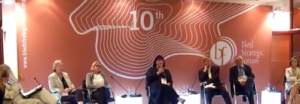 Civic education for financial literacy is needed. Older people should be freed of dependency discourse. The need for a UN Convention on Older Persons’ rights.
Civic education for financial literacy is needed. Older people should be freed of dependency discourse. The need for a UN Convention on Older Persons’ rights.
At the 10th Bled strategic forum Dušana Findeisen, vice president of DANET, moderated the panel Ageing Society and Development: Is progress without change possible? The discussion of the panellist was largely directed towards what is DANET’s mission: social participation of older people, their contribution to social and economic development, dialogue and cooperation of generations as well as global cross-cultural dialogue. It goes without saying that the panellists were willing to consider also the issues of older adult education and intergenerational learning enabling the contributory role of older people.
Elsa Forneri, former minister of labour in the Mario Monti Government and Anja Kopač Mrak current Slovenian minister of labour, social affairs, family and equal rights addressed the issue of the need to reform state pension shemes, to supplement state pensions by private insurance benefits. The transfer from the rich to the poor is recommended, pensions are not to be downsized, but citizens should work longer. More importantly Elsa Fornero pointed out that reforms were a social investment and should be regarded as such. They have to be understood, therefore financial literacy civic education programmes are needed.
Vitalia Gaucaite Wittich, chief of Population Unit (United Nations Economic Commission for Europe) European Committee on Ageing was addressing intergenerational cooperation. EUCEN launched a project in in Georgia. Everybody beyond retirement age in Georgia was invited to participate in a contest submitting an essay of up to five pages about: …What is it like to age in Georgia, …the lessons of life and the advice to give to today’s younger generation, …what to change about the policy-framework on ageing in Georgia. DANET could eventually run a similar project for the Danube region. Artistic photos of the older writers were contributed by a young talented photographer. To what extent the older people’s statement could be taken into account in creating a policy on age and ageing in this country, is difficult to say. But all panellists agreed that older people should be given a voice, should be listened to in our economy of knowledge where knowledge is produced together and shared.
The year 2015 is expected to be a landmark in social development
2015 should be a landmark in social development. European Social Charter has turned 50, UN social agenda for the times beyond 2015 is being in preparation and the whole year 2015 is the year of development. The panel was underlining the need for a UN Convention on Older Persons’ Rights. If it were adopted, it would be, of course, legally binding.
James Collins, the chair of the NGO Committee on Ageing at the United Nations in New York pointed out that agesim, social construction of ageing and discrimination on the ground of age do not appear in any human rights convention, but they should! Consequences of agesim can be felt evrywhere in medical and social services, education, economy, policies, media, arts etc. Older people have specific needs and should have specific rights. Moreover, what should be addressed is social justice on the distributive, but also on social, cultural and symbolic level. All too often older people are treated as invisible in our societies. Social construction of age remains important and ageism will not just go away unless we combat towards this goal.
Particular attention is to be paid to older people within conflict situations, refugees shifts or within economic migration. Cross cultural education seems to be particularly important in connection with this.
James Collins and Alexander Sidorenko pointed out the need for a UN Convention on Older Persons’s rights. Are the needs of older persons so unique that they should be addressed separately? It seems that the answer is yes. In no Human rights convention discrimantion on the ground of age and agesim are mentioned, though the consequences of ageisim can be felt everywhere: in health services, educational structures, in the media and arts, in policies and legal instruments. There is still important work to be done changing the mind set through public campaign, lectures, educational programmes etc.
Are older people object or subject of silver economy?
Older people are still being regarded as object of economic endeavours, as object of silver economy, as those to whom technological knowledge should be transmitted, and as consumers boosting economy. But no, older people to have an active role to play in silver economy as innovators and contributors as transmitters and recievers of technological knowledge and skills. ( Zoran Stančič, Deputy Director- General, Directorate- General for Communications Networks, Content and technology, European Commission).
During the informal meetings, the discussion on what DANET is and on what DANET struggles for were taken on. There was a general conclusion. Older people contribute and will be contributing to the development, on condition cultural changes in the attitude towards them were achieved. Older people have the right to socio-economic fairness, cultural and symbolic fairness notwithstanding their social status or age. Moreover, paradigmatic thinking about old age and older people has been operated, it is now high time to translate it into action, concluded Alexander Sidorenko, global ambassador on ageing.
